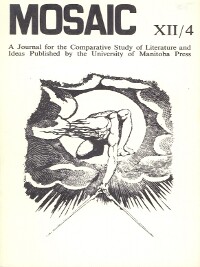Issue 12.4
Overview

General Issue
Published: July 1979
See the issue summary and contents below.
12 essays, totalling 168 pages
$15.00 CAD
Essays in this general issue of Mosaic look at religious tolerance and religious transcendence in G.E. Lessing; puns on Stéphane Mallarmé’s name; metaphoric and literal portrayals of incest as a Romantic trope; forms of female alienation in Bertolt Brecht, Alexander Kluge, and Heinrich Böll; and narrative, history, and character in Anglo-Saxon Attitudes. Also in this issue are essays on D.H. Lawrence, Gerard Manley Hopkins, Hjalmar Söderberg, Franz Kafka, Northrop Frye, Mark Twain, and the figure of Lucrece.
The Parable of the Three Rings in Nathan der WeiseJay Newman | |
Caliban in Nottingham: D.H. Lawrence's The Lost GirlPhillip F. Herring | |
The Incantation of a Name: From "mal armé" to "mâle armé"Will L. McLendon | |
Newman and the Motif of Intellectual Pain in Hopkins's "Terrible Sonnets"Michael D. Moore | |
Ethical Murder and Doctor GlasReed Merrill | |
The Geschwister-Komplex: Romantic Attitudes to Brother-Sister Incest in Ibsen, Byron, and Emily BrontëErrol Durbach | |
The Ethical Question of Lucrece: A Case of RapeSaad El-Gabalawy | |
Alienation and the Retention of the Self: The Heroines of Der gute Mensch von Sezuan, Abschied von Gestern, and Die verlorene Ehre der Katharina BlumJ.C. Franklin | |
Power and Authority in The CastleRichard J. Arneson | |
Medievalism, Make-Believe, and Real Life in Wilson's Anglo-Saxon AttitudesThomas Hahn | |
The Form of Northrop Frye's Literary Universe: An Expanding CircleRobert Mugerauer | |
"Stolen from Books, Tho' Credit Given": Mark Twain's Use of Literary SourcesAlan Gribben |